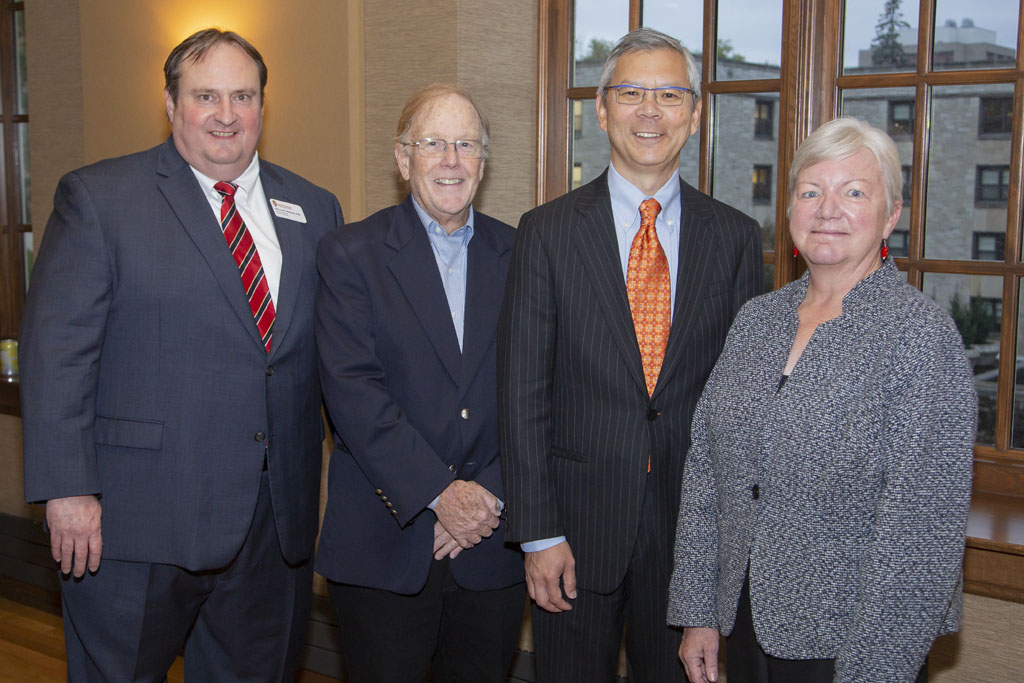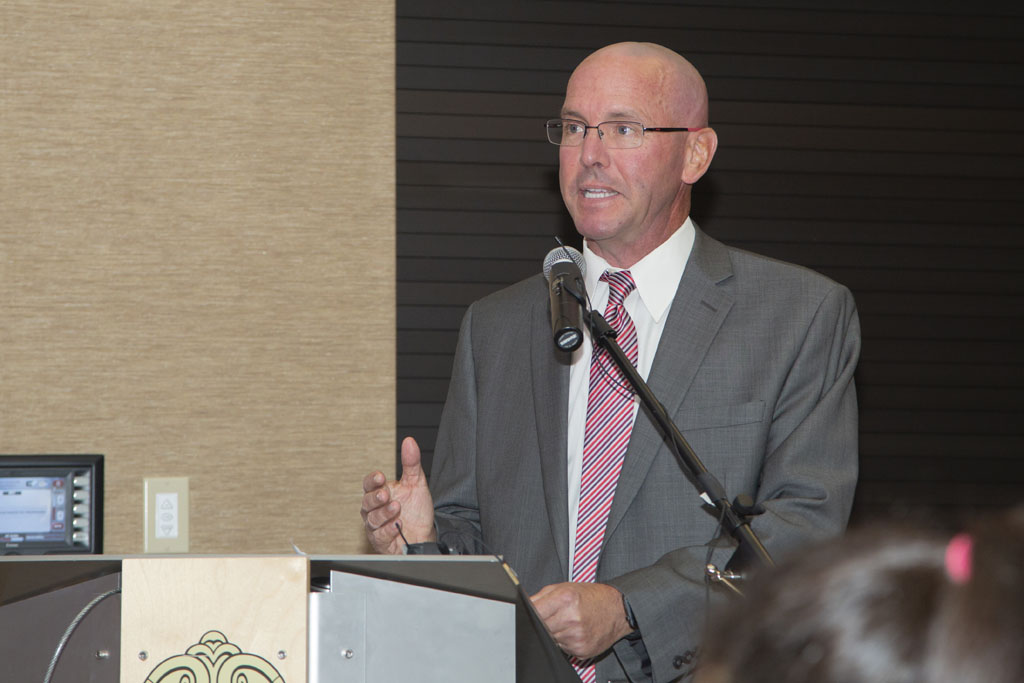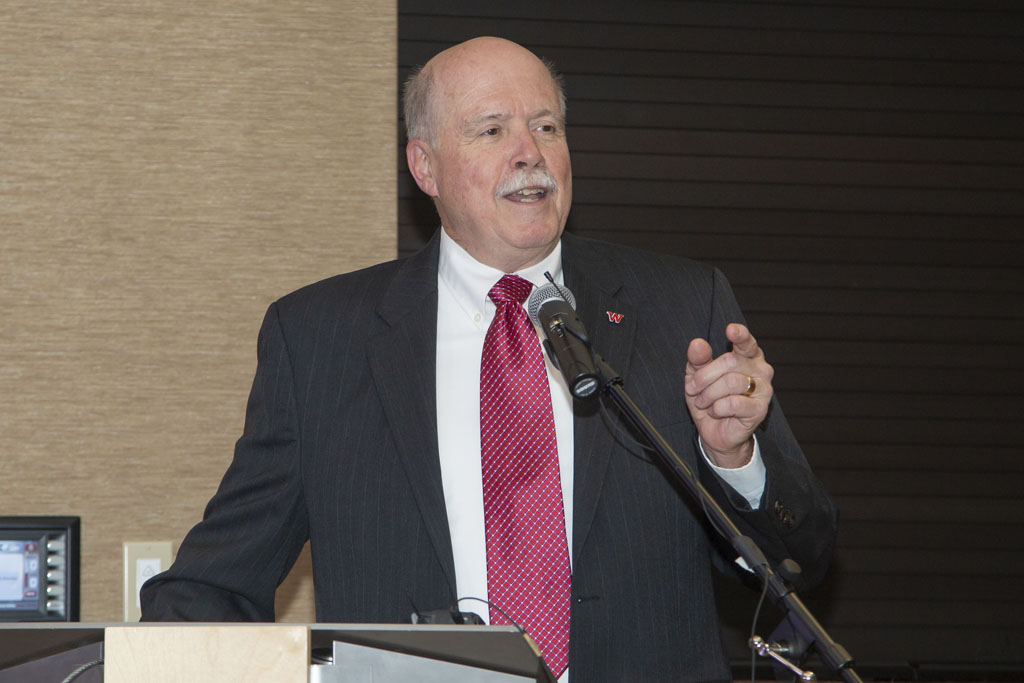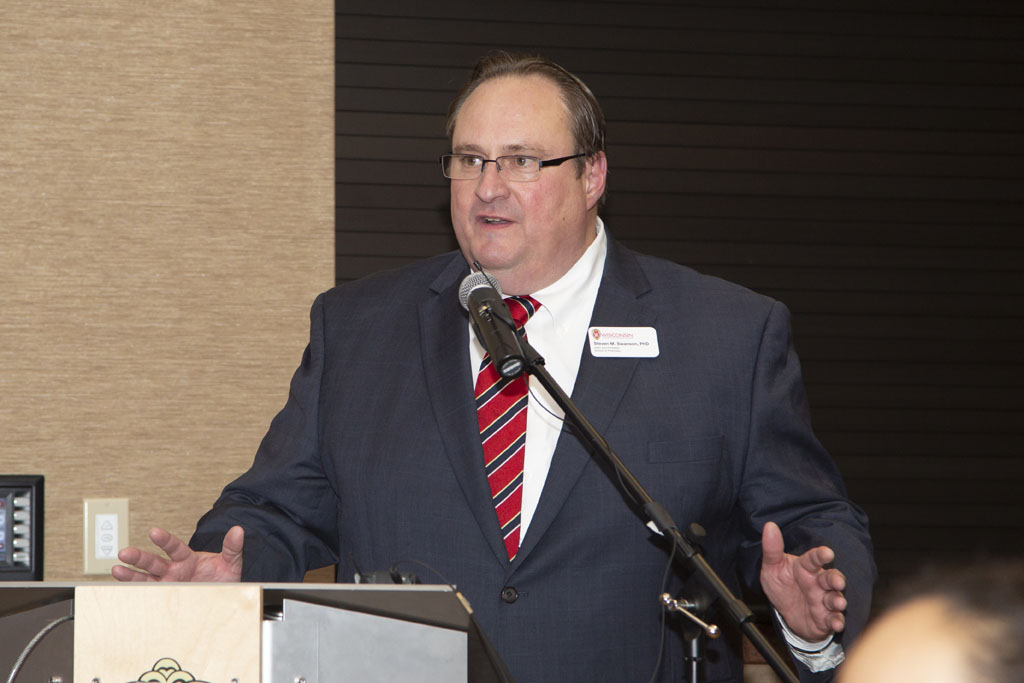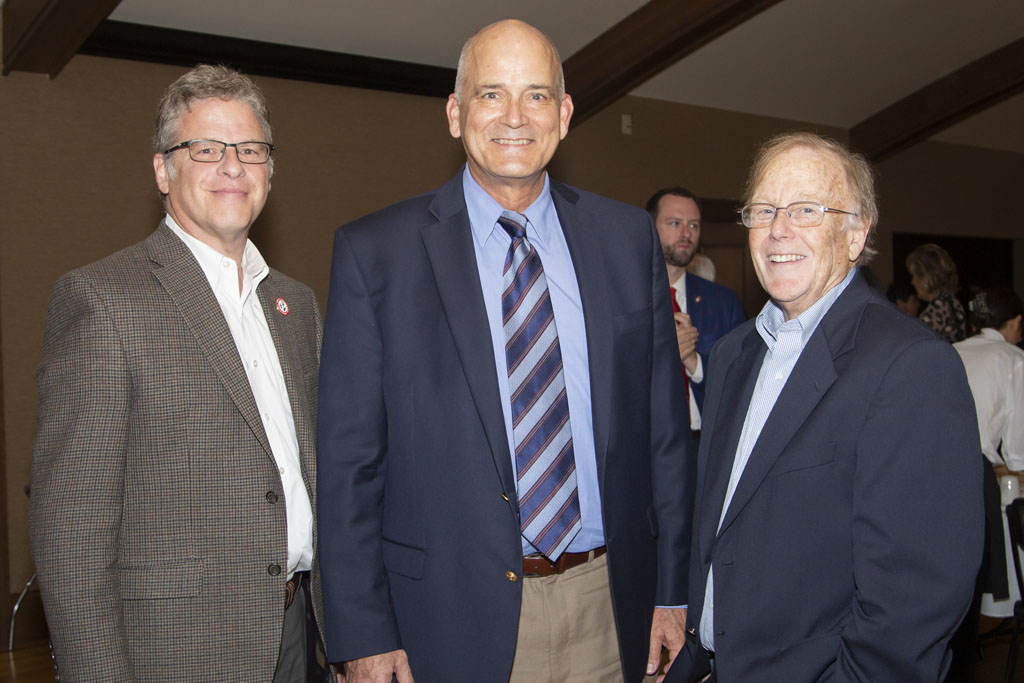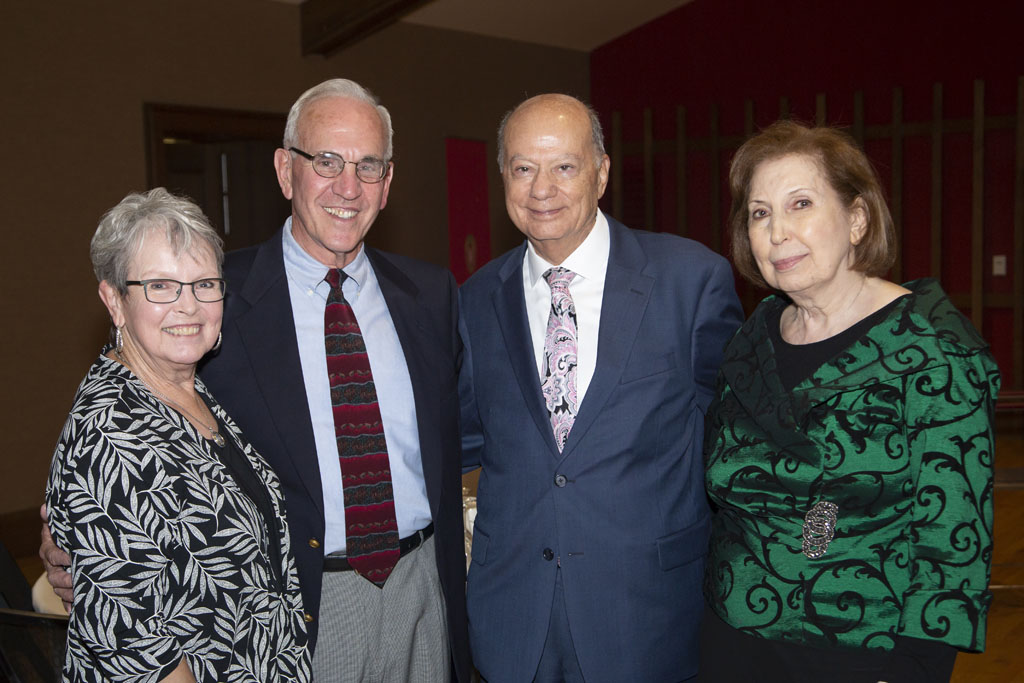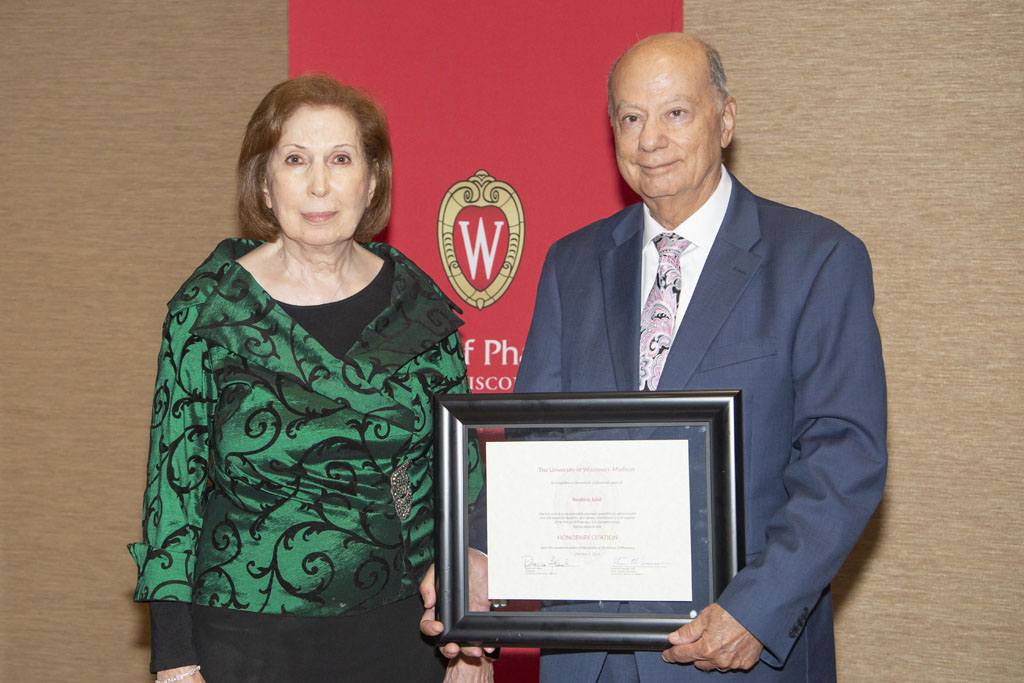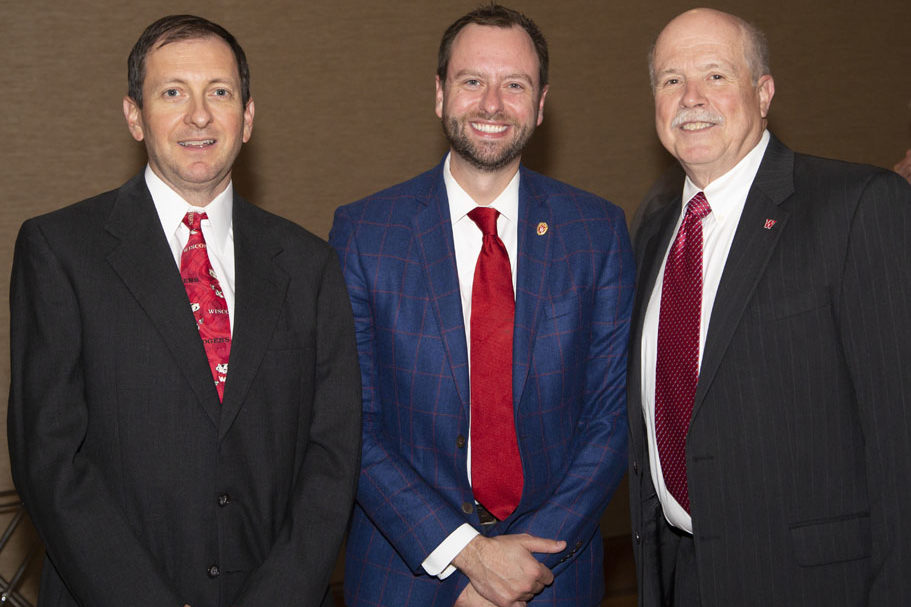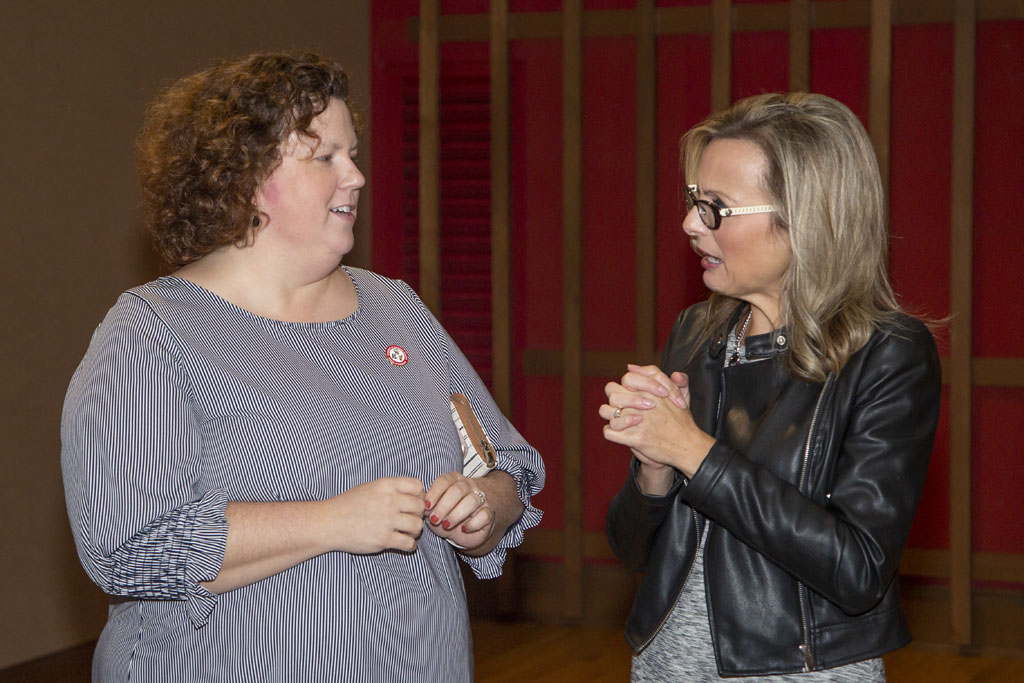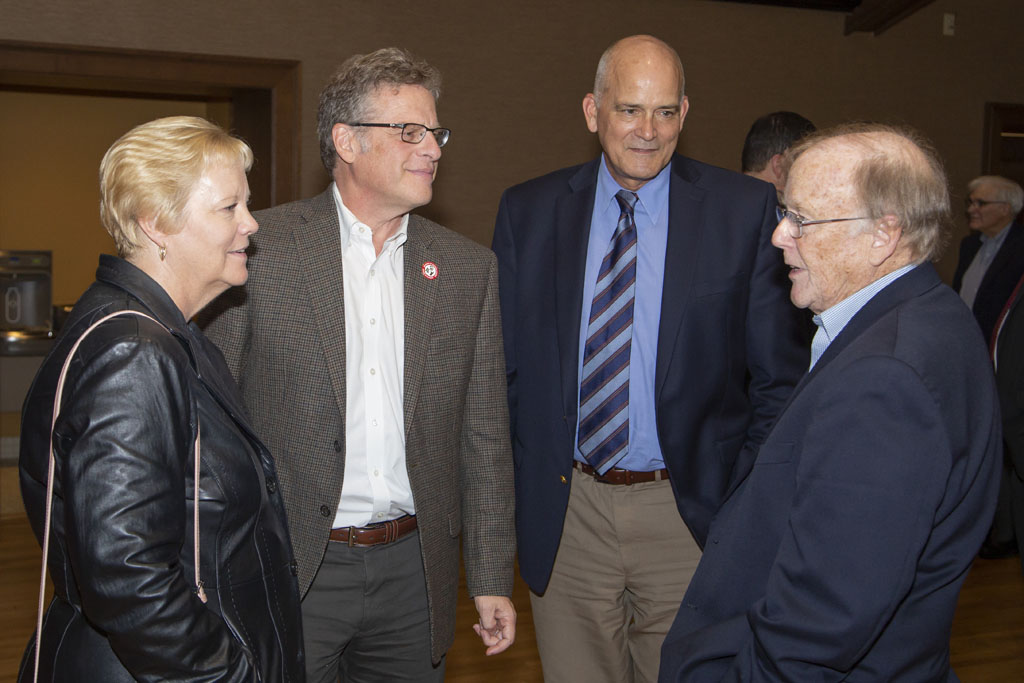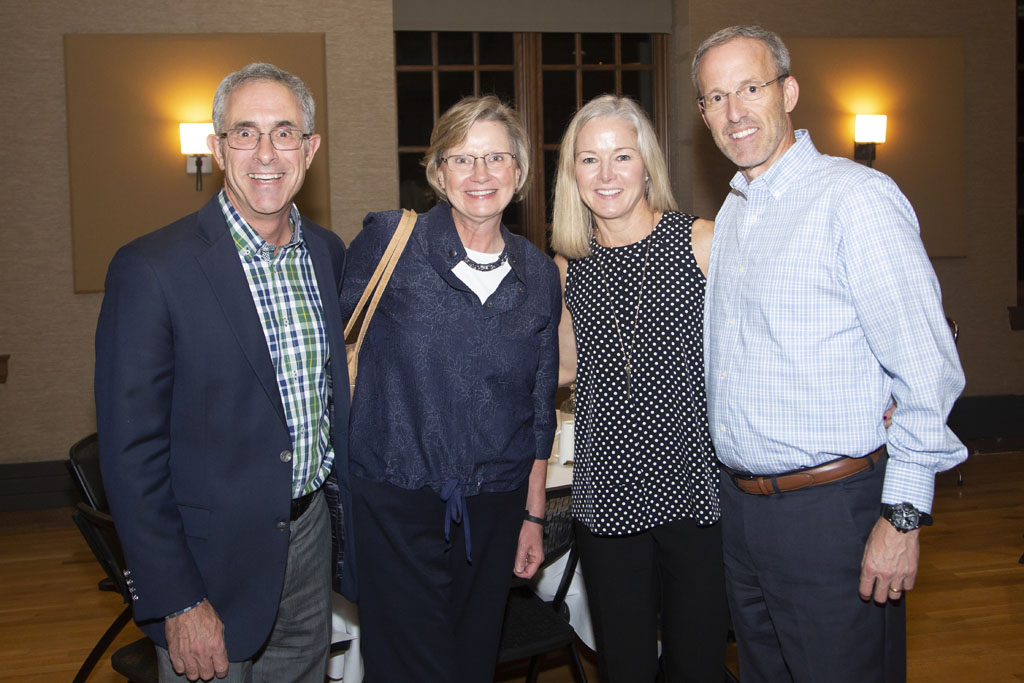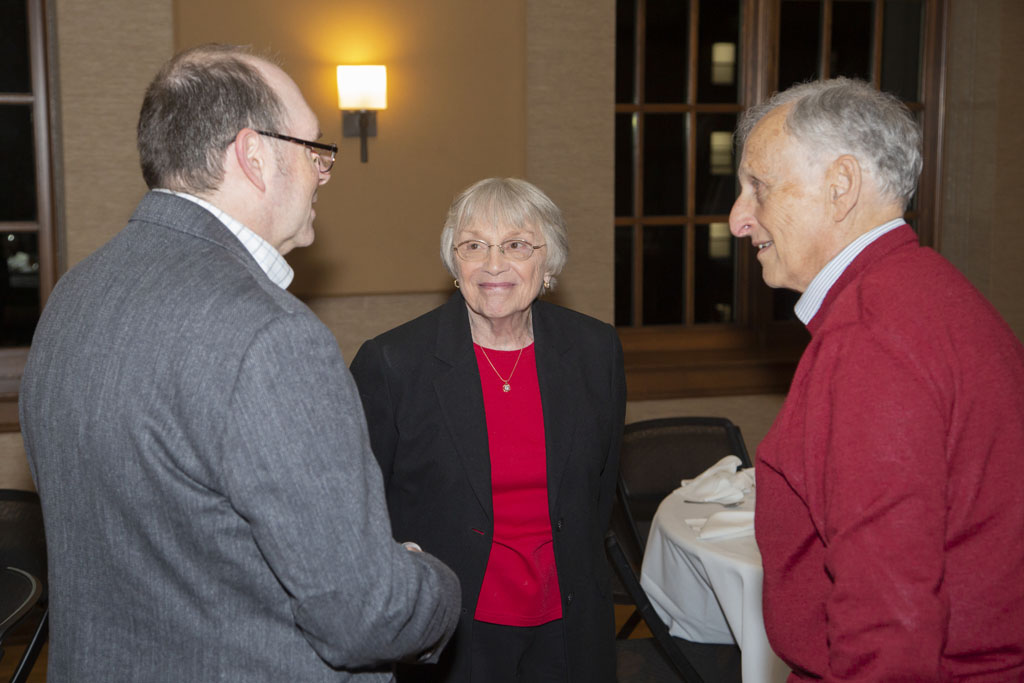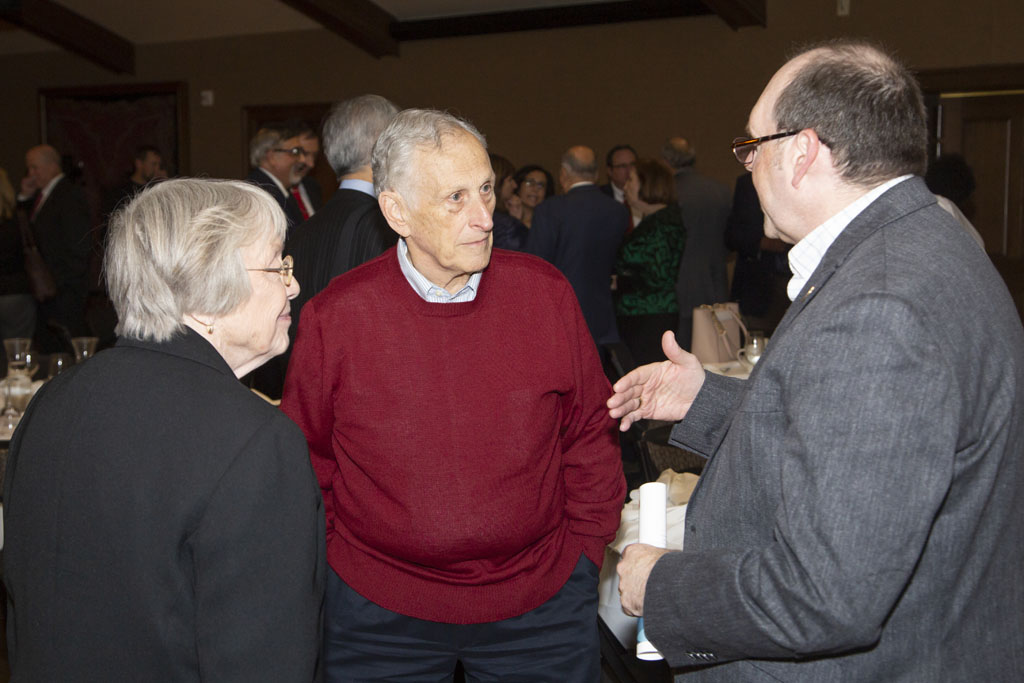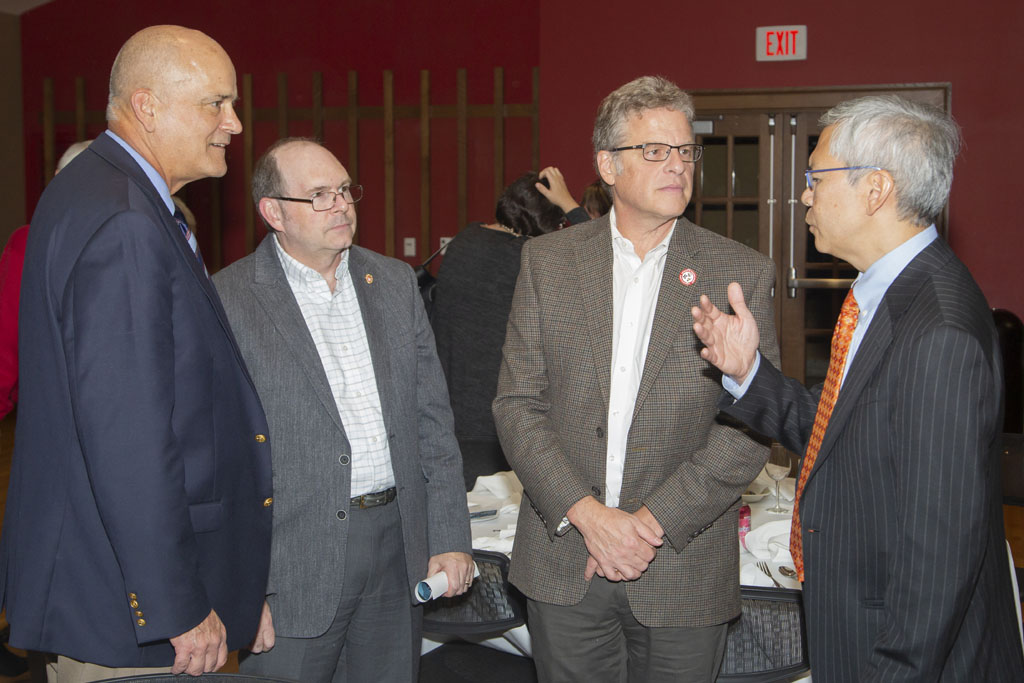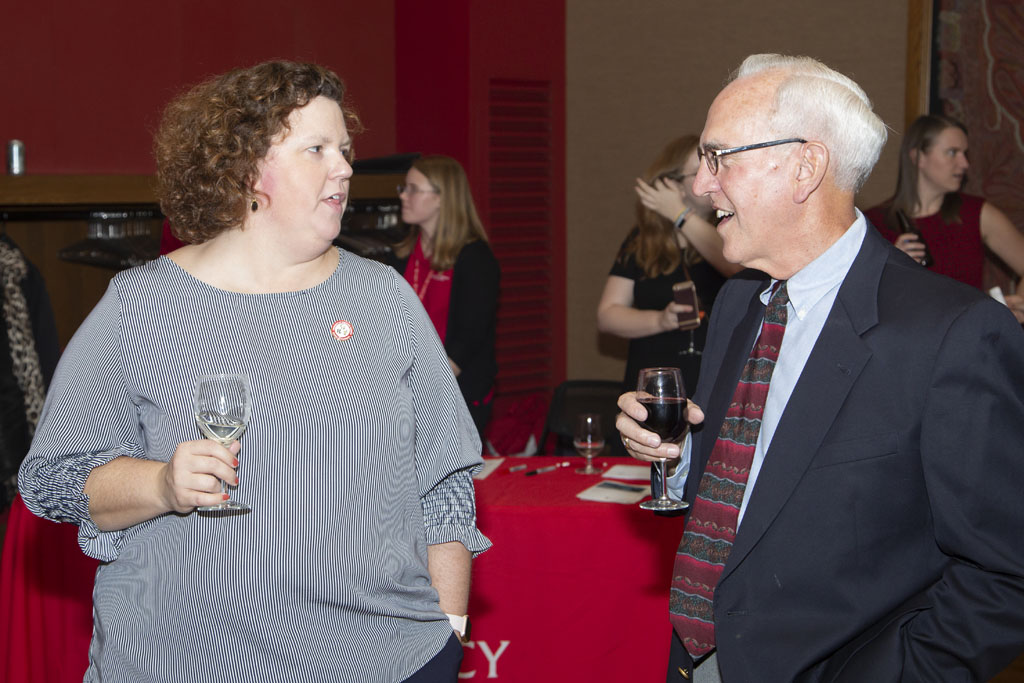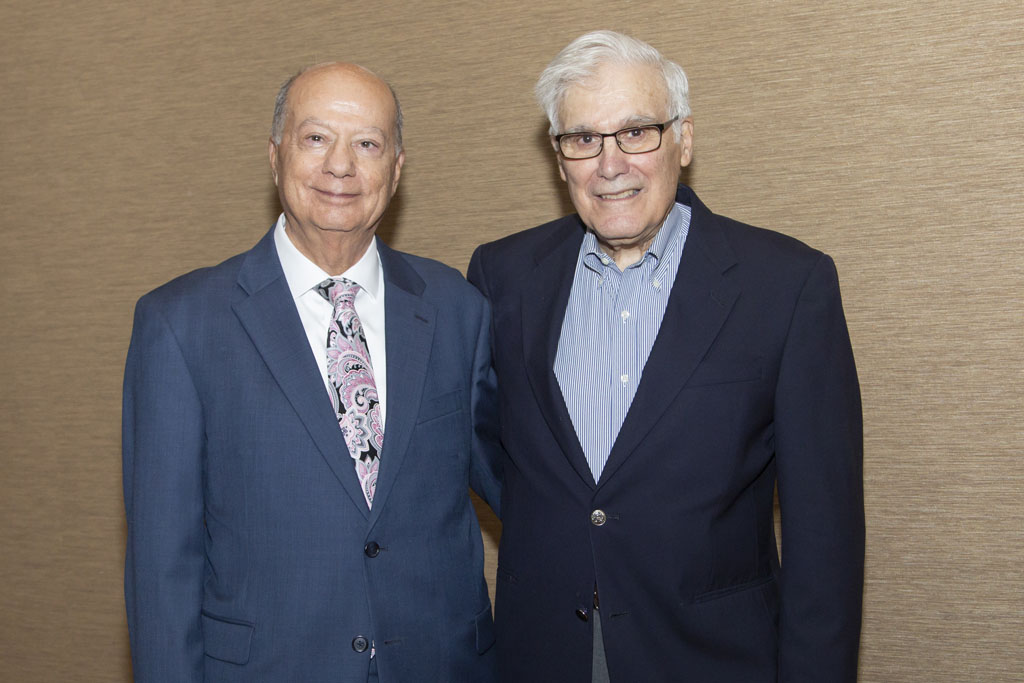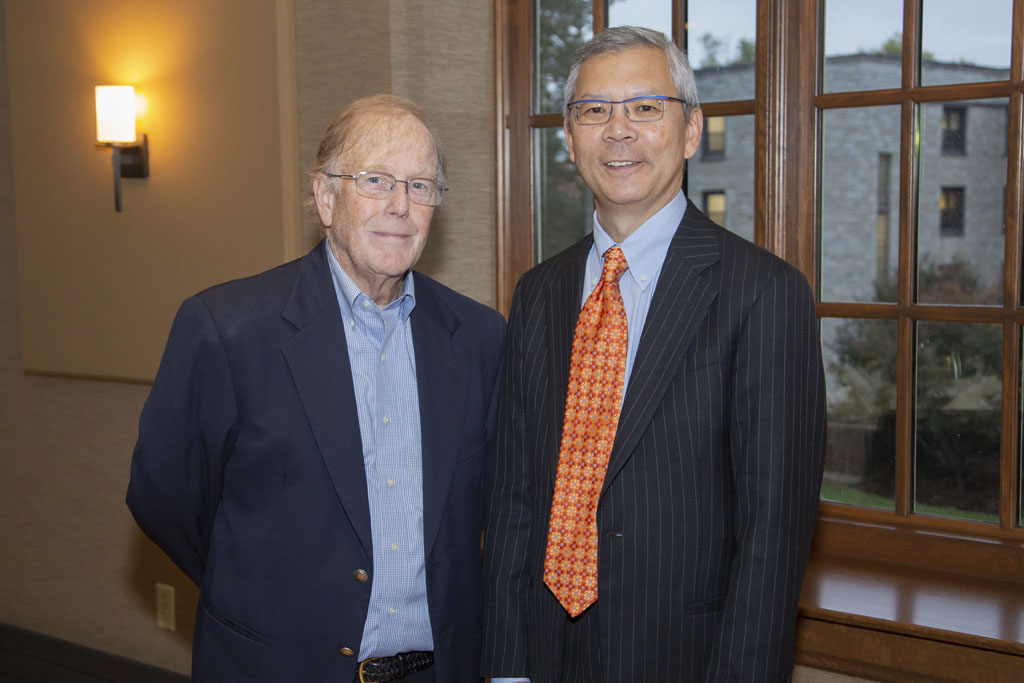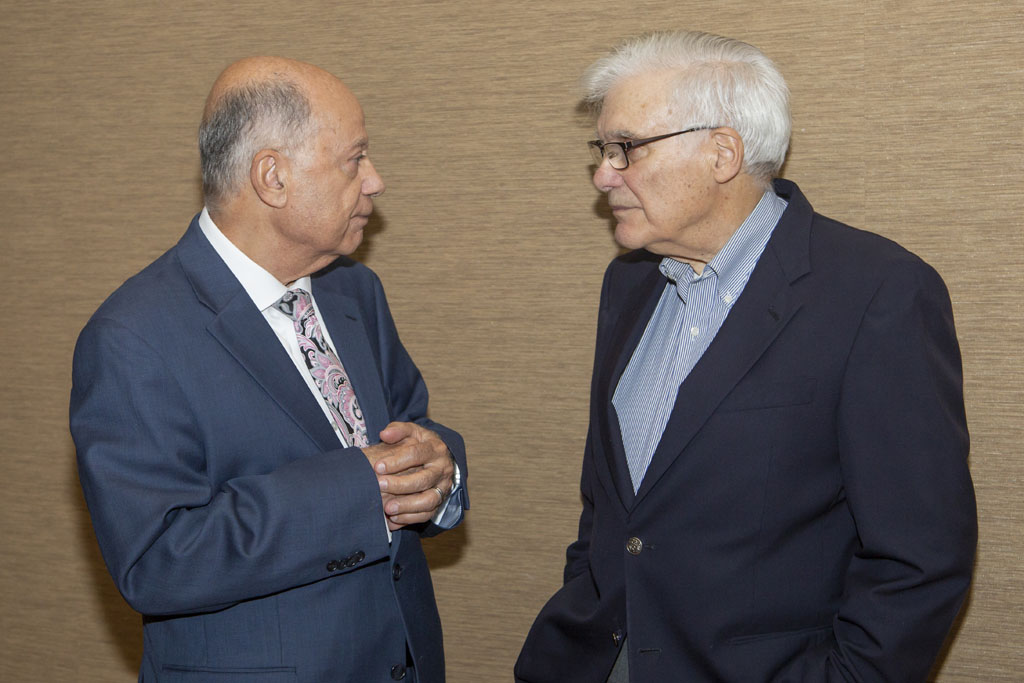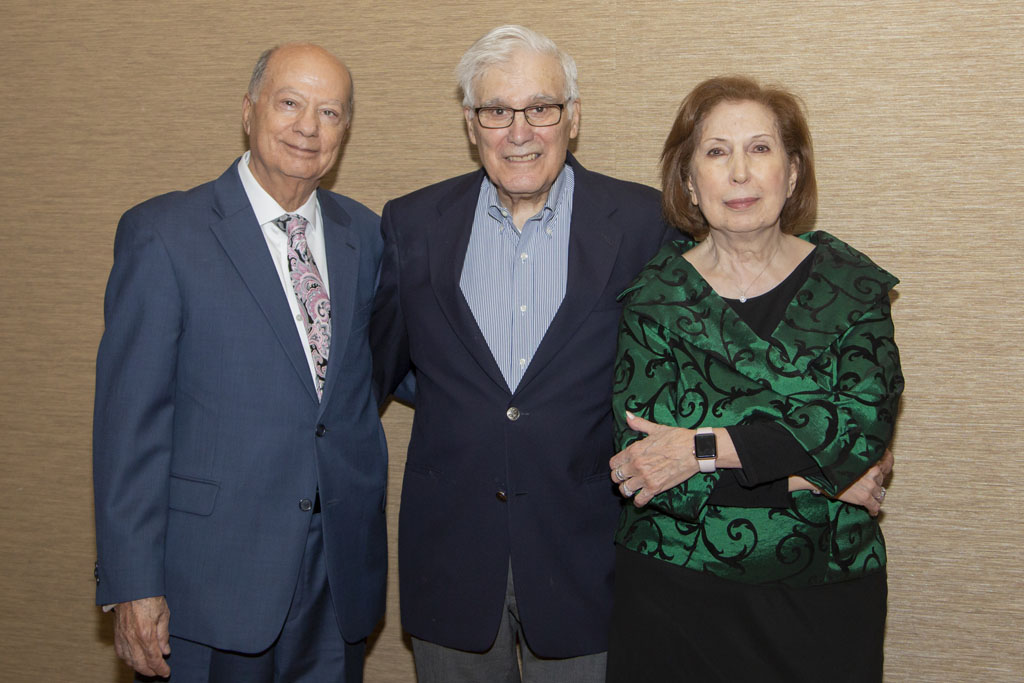Badger alumni and a Wisconsin pharmacy leader are honored for their contributions to the field
By Katie Ginder-Vogel
Photos by John Wingren
Each year, the University of Wisconsin–Madison School of Pharmacy honors distinguished pharmacists and pharmaceutical scientists with Citation of Merit awards that recognize their support of the School of Pharmacy and their contributions to pharmacy, research, and society.
“The Citation of Merit is the School of Pharmacy’s highest annual award,” says Eric Buxton, associate professor and chair of the Division of Pharmacy Professional Development, who has served on the Awards and Citations Committee for the past year. “These people have extraordinary talents that they’ve wholeheartedly applied for the betterment of others.”
When the nominations and recommendations for award recipients flow in, they typically include School of Pharmacy alumni, former faculty members and educators, and professionals with distinguished careers and strong records of service in their communities or in the development of student pharmacists.
“When we look at these nominees, it tells us the impact the UW–Madison School of Pharmacy really has,” says Buxton. “It’s awe-inspiring. There are so many people out there changing the world for the better.”
The 2018 honorees, who received their awards at an October reception and dinner, are:
- Jim De Muth, professor emeritus in the Division of Pharmacy Professional Development
- Christopher Decker, executive vice president and CEO of the Pharmacy Society of Wisconsin (PSW)
- Ibrahim Jalal, senior corporate vice president of technical affairs at Hikma Pharmaceuticals PLC
- Roger Tung, president, CEO, director, and scientific founder of Concert Pharmaceuticals
“These four accomplished professionals have dedicated their careers to helping others, through empowering and advocating for Wisconsin pharmacists, leading innovation in the development of new drug therapies, and providing mentorship and education to further drive the profession forward,” says Steve Swanson, dean of the UW–Madison School of Pharmacy. “They exemplify what we want Wisconsin to stand for, and we’re proud to honor their achievements with Citations of Merit.”
Jim De Muth (MS ’72, PhD ’74)
Pioneer in continuing education
When Jim De Muth earned his undergraduate degree in pharmacy from Drake University in the 1960s, a wave of states were beginning to require pharmacists to complete continuing education training to renew their licenses.
“In 1968, two states created mandatory continuing education programs, and pharmacists in Kansas and Florida needed a certain number of credit hours to renew their licenses,” De Muth says. “My mentor in pharmacy school suggested I get a continuing education degree in graduate school and return to Drake to establish a program for pharmacy continuing education.”
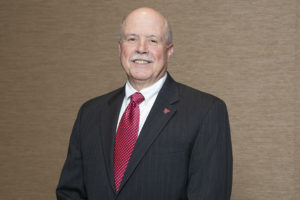
The UW–Madison School of Pharmacy was the only school in the nation to offer master’s and PhD degrees in pharmacy continuing education, so it was a natural choice for De Muth to enroll.
“I went from the science of pharmacy into adult education,” says De Muth. “I had a research assistantship during my last three years of graduate school, and it offered me the opportunity to develop and implement programming for pharmacists.”
Although he planned to take his new expertise in continuing education (CE) back to Drake, his career plans again changed.
“The decision to stay at Wisconsin was based on an opening in the School of Pharmacy’s Division of Pharmacy Professional Development and the opportunity to work at the most prominent CE provider in the United States,” DeMuth explains. “I went through pharmacy school hoping to work in a hospital or retail pharmacy and ended up doing something completely different. Options presented themselves, and things changed. Always keep yourself open to new opportunities.”
De Muth joined the School of Pharmacy faculty in 1974 and trained pharmacists in continuing education. In the 1990s, he took over the School of Pharmacy’s industry training programs and developed offerings in pharmaceutical analysis, research and development, and quality control.
In the late 1990s, De Muth created two new Land O’Lakes teaching conferences for the School of Pharmacy, on drug metabolism/pharmacokinetics and bioanalytics, which continue to draw in experts from around the world. The former professor also developed hundreds of distance and face-to-face learning programs for pharmacists, created a certificate program in applied drug management, and has published nearly 60 research articles on pharmacy and adult education, plus three editions of a textbook: Basic Statistics and Pharmaceutical Statistical Applications.
“I know how difficult the selection process is for these awards, and I know the quality of past recipients. To be among those people is a great honor.” –Jim De Muth
His research earned him two awards from the American Association of Colleges of Pharmacy: a Rufus A. Lyman award, which is a top honor recognizing the best paper published in the American Journal of Pharmaceutical Education each year, and a William L. Blockstein Award for his sustained contributions to continuing pharmaceutical education.
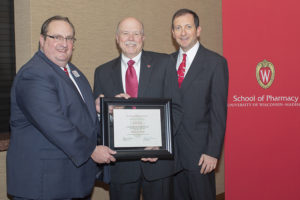
“Dr. De Muth is a man of many trades and is still teaching statistics and holds an influential position with the United States Pharmacopeia (USP),” says Associate Professor Eric Buxton, chair of the committee that selected the Citation of Merit awardees. “He’s had an impressive 40-year career that’s far from done.”
A self-described “statistical hobbyist,” De Muth spent 25 years as a statistician on the Institutional Review Board of Covance Laboratories. He remains active in public standard-setting for drugs and has chaired the USP National Formulary expert committee since 2000. In 2010, De Muth won the first USP Award for Outstanding Contributions to the Standards-Setting Process.
Although the School’s Citation of Merit is joining an abundance of other awards and recognitions earned by De Muth, it carries a special significance for him.
“I served on the Awards and Citations Committee for many years and chaired it for the previous three, so I know how difficult the selection process is for these awards, and I know the quality of past recipients,” he says. “To be among those people is a great honor.”
Chris Decker
Connecting and advancing Wisconsin pharmacists
Chris Decker’s close relationship with the UW–Madison School of Pharmacy began the moment he joined the Wisconsin Pharmacists Association (WPhA) as executive director in 1990, he says. He even spent a month living with Gus Lemberger, then dean of the School, while he made the move to Wisconsin from Iowa, where he had earned his pharmacy degree.
When Decker was in pharmacy school, he was actively involved in student organizations, thanks to the advice and example of his first pharmacist mentor and family friend, community pharmacist Bob Osterhaus. “I learned at his wingtip,” jokes Decker of Osterhaus, a former president of the American Pharmacists Association. “He wore wingtips every day.”
Following graduation, Decker spent two years working with the Iowa Pharmacy Association with another of his mentors, Tom Temple, before being hired as the WPhA’s executive director, at age 25.
“My first aim was to get the association grounded and moving forward, by leaning on my experiences in Iowa and duplicating best practices from around the country,” explains Decker. He immediately began to reach out to younger pharmacists, female pharmacists, and other underrepresented practitioners to get them into leadership roles and increase their visibility.
In 1997, Wisconsin became the first state to combine its two distinct organizations for pharmacy professionals, WPhA and the Wisconsin Society of Health-System Pharmacists, to create the Pharmacy Society of Wisconsin (PSW).
“We believed we could do better as one—be more efficient and effective in getting key leaders in one room, building momentum, and capitalizing on talent and limited resources,” says Decker. “We have succeeded, thanks to many people working together.”
The merger was a huge undertaking, and Decker played an influential role in the process, collaborating with leadership from both organizations to create “one vision, and one voice.” He has served as CEO of PSW since its creation.
“We set out to move Wisconsin to the top tier,” says Decker. “It’s taken some time, but I’m pleased to say that PSW is now recognized as being among the best of the state pharmacy associations.”
“Great leaders don’t set out to be leaders; they set out to make a difference. It’s about the goal, not the role.” –Chris Decker
During his 25-year tenure at PSW/WPhA, Decker has worked closely with numerous School of Pharmacy deans, dozens of faculty members, and hundreds of students.
“Working together requires goodwill, seeking long-term successes that can be built upon, year after year,” he says. “It also requires aligning self-interest with a larger, collective interest. The profession’s best people have always done that.”
Decker’s professional network is quick to categorize him as among “the profession’s best people.”
“Decker is very esteemed by his fellow professionals from numerous institutions,” says Eric Buxton, associate professor and chair of the Citation of Merit awards selection committee. “They describe him as having more influence than any other pharmacist on the success of Wisconsin pharmacy in the past 20 years. He is described as an outstanding leader of PSW, which he helped create.”
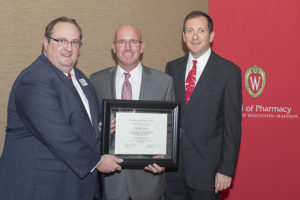
PSW and the UW–Madison School of Pharmacy have been intertwined since 1880, when the WPhA was founded for the express purpose of establishing a pharmacy school in Wisconsin. The two organizations continue to work in tandem.
In 2008, PSW won a $3 million grant from the Centers for Medicare and Medicaid Services, the first made to a pharmacy association, and engaged Dave Mott, professor and chair of the School of Pharmacy’s Social and Administrative Science Division, for analysis. The project, the Wisconsin Pharmacy Quality Collaborative, has received national attention and just celebrated its 10th anniversary.
“That’s an example of the work PSW has been able to pursue because of the unification and talent we’ve engaged,” says Decker.
Decker, one of very few Citation of Merit honorees in the award’s 65-year history who is neither an alumnus nor a former faculty member of the School, says he is honored to be recognized by the School of Pharmacy and encourages current pharmacy students to strive to make a positive difference in the world.
“If every UW–Madison School of Pharmacy graduate is kind, considerate, and strives to make a difference in the lives of all with whom they interact, the depth and breadth of that collective impact will be enormous,” he says.
“Great leaders don’t set out to be leaders; they set out to make a difference,” Decker adds. “It’s about the goal, not the role. Individual aspiration and achievement are important motivators, but sustained achievement comes from doing good work and treating people well, while being both adaptive and committed to principle. It’s how good things get done and last.”
Ibrahim Jalal (PhD ’78)
Leading the pharmaceutical industry through mentorship
“To be recognized for my contributions to science and technology by such an esteemed institution is humbling,” says Ibrahim Jalal. “I am honored to be one of the few alumni to receive the Citation of Merit award, and I am delighted for the opportunity to return to Madison to visit the School of Pharmacy.”
Jalal earned his PhD from the UW–Madison School of Pharmacy in 1978, and has worked in the pharmaceutical industry for more than 40 years. Currently, he is the senior corporate vice president of technical affairs at Hikma Pharmaceuticals, based in Jordan, where he grew up. During his tenure at Hikma, the company grew from 50 to 8,500 employees, and from a single manufacturing plant to 29, scattered across the world.
Earlier in his career, he was a production manager for Arab Pharmaceutical Manufacturing, also in Jordan, until he earned a scholarship from the World Health Organization to attend the Philadelphia College of Pharmacy and Science, now the University of the Sciences in Philadelphia.
Jalal and his wife, married just three weeks, first came to Madison in 1973.
“I wanted to pursue my PhD at one of the top schools in the U.S., and UW–Madison was and still is one of the top 10,” he says.
Associate Professor Eric Buxton, who chaired the committee that selected the Citation of Merit awardees, says Jalal embodies the Wisconsin Idea.
“He took his degree from the UW–Madison School of Pharmacy, went back to Jordan, and flourished with a drug company there,” says Buxton. “He kept publishing new research and remains active in several committees and associations. He’s a man of many talents, and he applies them enthusiastically.”
“I’ve mentored most of the leadership at Hikma Pharmaceuticals because my career has always been in the technical science field, with heavy experience in research and development and leading plant inspections for FDA approval,” explains Jalal, and he encourages all researchers to do the same.
“Mentor those working with and for you; it is your ethical responsibility and professional duty,” he says. “Have ownership of what you do and do it with passion. And the higher you are on the management scale, the more humble you should be.”
His appreciation for and devotion to mentorship traces back to his time working under School of Pharmacy Professor George Zografi, now emeritus. “I am so grateful to Dr. Zografi for his mentorship and invaluable guidance,” he says. “He was exceedingly helpful and humble in mentoring. He became the dean of the School of Pharmacy in my second year, but he made sure to leave his door open for me.”
“I am honored to be one of the few alumni to receive the Citation of Merit award, and I am delighted for the opportunity to return to Madison to visit the School of Pharmacy.” –Ibrahim Jalal
Jalal says working independently and being passionate about science was part of what he learned at the School.
“I learned invaluable research skills, including the proper documentation of research data, whether predicted or not, data interpretation, and research ethics,” he says. “This knowledge provided me with a strong background to carry on proper scientific research and development geared towards a final safe and effective drug product that complies with current good manufacturing practices.”
Throughout his busy years in graduate school, Jalal enjoyed life in Madison with his wife, Nadia, and their daughters. He says they were lucky to join a diverse environment at the School.
“For a couple coming from the Middle East, we found it easy to integrate into the academic community,” says Jalal. “One of the most impressive things about the community was its diversity.”
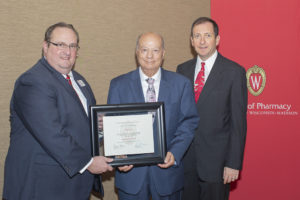
Jalal and his wife got involved in cultural activities on campus, which allowed them to sample international foods and learn about different cultures.
“This opened us up to the world and taught us to accept people and respect them based on their values, rather than their race, gender, or religious background,” Jalal says. “We were influenced by the values of American society and wanted our girls to grow up with confidence, independence, and opportunity.”
Jalal’s daughters, two of whom were born in Madison, have all also found success in STEM fields.
“I am grateful to be sharing this award with my amazing wife, Nadia, and my four wonderful daughters, Diana, Rania, Shadia, and Saba,” he says. “They stood by me and put up with my long working hours and my frequent travel away from home. I wouldn’t have realized the successes I have, if it hadn’t been for their love and support.”
While visiting Madison to accept his award, Jalal made time to advise current School of Pharmacy graduate students during a roundtable discussion. His strongest advice: “Dream big, and follow your dreams.”
“Work hard and invest in yourself, accept new responsibilities, and treat problems and difficulties you face as challenges,” he says. “And finally, enjoy your life in this beautiful city.”
Roger Tung (PhD ’87)
Innovative entrepreneur in the pharmaceutical industry
Over his impressive 30-year career, Roger Tung has never kept still—founding two pharmaceutical companies, holding more than 100 patents, and publishing more than 100 papers.
“My graduate training at the UW–Madison School of Pharmacy—educational and lab-specific—led very directly to my current career,” says Roger Tung, who is president and CEO of a biotech company, Concert Pharmaceuticals in Lexington, Mass., focused on developing treatments for autoimmune disease and disorders of the central nervous system, such as alopecia and cystic fibrosis.
“Doctoral students in the pharmaceutical/medicinal chemistry track at the School of Pharmacy were required to take the core curriculum of both the chemistry and biochemistry departments,” he says. “Going through those fundamental core courses shaped a lot of the way I think as a scientist. That background was really important and impacted the direction my career took.”
That direction turned out to be entrepreneurial leadership in the pharmaceutical industry, brought to life through the self-reliance, intellectual curiosity, tenacity, and presentation experience he says he learned at the School of Pharmacy.
Before co-founding Concert Pharmaceuticals, Tung was also a founding scientist of another pharmaceutical company: Vertex. And before that, he held numerous research-focused positions with Merck, Sharp and Dohme Research Laboratories, and the Squibb Institute for Medicinal Chemistry.
“The number of active drugs Dr. Tung has created, for cystic fibrosis, HIV, and hepatitis C, is mind-boggling,” says Associate Professor Eric Buxton, chair of the Awards and Citations Committee. “His contributions to science are immense and his commitment to service is inspiring. He actively serves on the School of Pharmacy’s Board of Visitors. He’s a busy person, but he unfailingly makes time to give back to the School and its current students.”
“The School trains people in diverse ways and that enables them to have a broad impact on science and society, and it’s really cool to see the range of educators and academicians and the company contributors and founders who have also earned this award.” –Roger Tung
In his first year of graduate school at the School of Pharmacy, Tung learned from JoAnne Stubbe and W. Wallace “Mo” Cleland, both former biochemistry professors at UW–Madison. Cleland, one of the world experts on enzyme isotope effects, focused a significant amount of the curriculum on the study of enzymes and included background on enzyme isotope effects.
“About 13 years ago, when I was thinking about starting Concert Pharmaceuticals, I ended up basing the company on the use of deuterium isotope effects on medicinal agents,” says Tung. “That came out of my collaborative and comprehensive education at UW–Madison.”
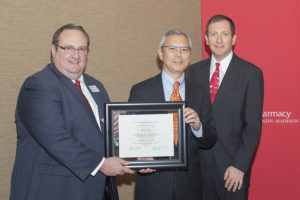
Tung also worked in the lab of Professor Dan Rich, now emeritus, which was focused on medicinal chemistry and primarily composed of postdocs, with a few graduate students.
“He had experts in organic synthesis, peptide synthesis, and enzymology—a broad set of skills and perspectives,” says Tung. “That was really important in causing me to be more of a scientific generalist than a specialist. Professor Rich’s research covered a wide range of pharmaceutically important areas. What I learned in his lab about topics such as cyclic peptides and the design of aspartyl and serine protease inhibitors was important to my drug discovery work long after. I owe a lot to my experience at UW–Madison and the many mentors I encountered there.”
“The Citation of Merit is a tremendous honor,” Tung says. “The School trains people in diverse ways and that enables them to have a broad impact on science and society, and it’s really cool to see the range of educators and academicians and the company contributors and founders who have also earned this award.”
For current and future researchers, Tung emphasizes the importance of having a breadth of experience, noting that he benefited from many things that weren’t specifically the focus of his dissertation.
“When you’re in the process of doing a PhD, everything feels like it narrows down to a tunnel, and you have to make it through to daylight by the end of the process,” he says. “But that is really your one opportunity to learn in a way that you will rarely—if ever—have again in your career.”
See the full list of previous Citation of Merit award winners.
